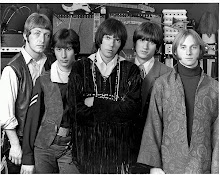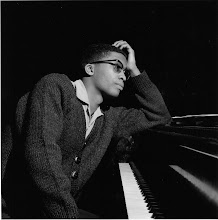
During 1966-1969, Charles Lloyd led one of the most popular groups in jazz, a unit that played at the rock palace Fillmore West in San Francisco and toured the U.S.S.R. Lloyd's music, although generally a bit melodic, was not watered-down and managed to catch on for several years during a time when jazz was at its low point in popularity. After his group changed personnel in 1969, Lloyd gradually faded out of music, becoming a teacher of transcendental meditation. The few records he made in the 1970s were quite spiritual and bordered on new age. (AM)
With those sentences wonderfully said I can tell you that my Charles Lloyd listening started back in 1994. I picked up a used copy of Forest Flower. A friend suggested I listen to him. It was by chance that I should because he was someone I always heard him on the Jazz station in the car. I really did not hear about him in Jazz class or from the professor that gave me the Ornette Coleman, but the professor told me that he was really popular in his time. Even then he had a great band backing him that included Keith Jarrett, Jack DeJohnette, and Cecil McBee. Over the course of the next few years I studied his music from the 60's and the music of present time. In the 1990's he was on my favorite record label ECM. There is a point that ECM records are probably the most important records to own. Through the years ECM puts stuff out that changes what we know as music and it's all for the good.

After a few years of listening to Charles Lloyd I understood his purpose. He was not like an Ornette Coleman or a John Coltrane or any of the others I listened to, but he was smooth and very meditative. Then my luck struck when a friend called me and wanted to go to NYC for the Jazz festival. We would spend a week in the city and see lots and lots of live music. We would split what we wanted to see for live shows. We would even catch a rock show if one was around that we both liked. For both of us it was a good way to get away from our jobs. For me it was this chance to see Charles Lloyd. When the line up the festival was up in the paper. (I found it in the Village Voice) I showed the list to my friends. We both got stuff in the mail about the festival and made notes of what we wanted to see. Charles Lloyd was scheduled for a Thursday night at 11pm. I did not mind the time, because the whole evening was had great acts playing. Even better was the fact they were at my favorite venue. The Knitting Factory was a great place to see a show.
When I showed my friend the band backing Charles Lloyd I was in shock. It was Billy Higgins on drums, John Abercrombie on guitar, Dave Holland on bass, and Geri Allen on piano. It was my first time seeing Holland, Abercrombie, and Allen. Talk about a lineup of the ages. I was ready for that one. It was a year that Charles Lloyd did not have an album but he told the crowd that the people on stage are such great musicians that he might do an album with them. I was hoping he was. I loved all of them as jazz musicians. He played promptly at 11pm and did not finish till about 1:30am. After that he signed autographs and shook hands. Now I was hoping for a CD to come out of this performance or this band.

About year later the album came out. I quickly picked up Voices In The Night. The album included everybody except Geri Allen. (Side note Geri Allen and Charles Lloyd did work together on a soundtrack called Afterglow and then in 2005 on a great Lloyd album Jumping The Creek.) At first impression I was trying to remember the songs they played that night and see if they were on the CD. Only one was on the CD and the rest were numbers they worked on. It was great to hear the CD and remember that great night in NYC. What I found great on this CD were two songs. One was one of his early pieces of music and the other was one called "Pocket Full of Blues" It was a really great song. it had a wonderful groove and everyone has a solo on it. Charles Lloyd group at the performance and at the show are the best in the business. They knew how to play that Charles wanted to play. Each song is unique and out of the eight songs on the album two are not written by him.
I always say that you should check this or that out, but with Charles Lloyd he really is special. He is unique to Jazz and you can really appreciate what he does for music. He might not be talked about in conversation, but after this album I am sure he will. Still if you can find this CD it's worth every penny and maybe you too will put Charles Lloyd in your musical conversation. Enjoy a jazz album that not has an all-star cast, but an album that is all-star in musical greatness too. Enjoy!


































































MosaicImages1.jpg)



























I had the honor to study with Cecil McBee when I attended the New England Conservatory of Music in Boston, and I was happy to see him mentioned on this blog. I treasure the time I had with Cecil. An amazing bass player, composer and all-around musician. Just being in his presence and hearing the music that came out of him whenever he touched the bass or played piano was a learning expereince. He would tell me about auditioning for Miles (w/Herbie, Wayne and Tony) and gigging with Elvin Jones, or being a young musician playing with Freddie Hubbard and Bennie Golson. He also told me a little about his experience with Charles Lloyd which, sadly, does not seem to have ended happily. But for a couple of years Lloyd and his amazing quartet with Jack, Jarrett and Cecil was riding high. I'm sure Cecil's memories of those days at the Fillmore are as fond as my memories of the great Cecil McBee.
ReplyDelete